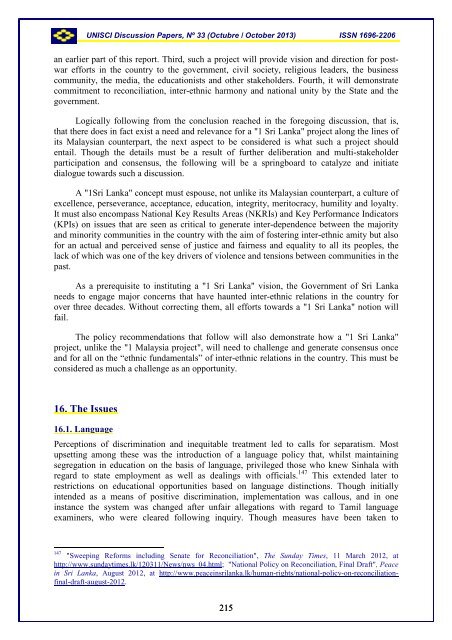UNISCI - Universidad Complutense de Madrid
UNISCI - Universidad Complutense de Madrid
UNISCI - Universidad Complutense de Madrid
You also want an ePaper? Increase the reach of your titles
YUMPU automatically turns print PDFs into web optimized ePapers that Google loves.
<strong>UNISCI</strong> Discussion Papers, Nº 33 (Octubre / October 2013) ISSN 1696-2206an earlier part of this report. Third, such a project will provi<strong>de</strong> vision and direction for postwarefforts in the country to the government, civil society, religious lea<strong>de</strong>rs, the businesscommunity, the media, the educationists and other stakehol<strong>de</strong>rs. Fourth, it will <strong>de</strong>monstratecommitment to reconciliation, inter-ethnic harmony and national unity by the State and thegovernment.Logically following from the conclusion reached in the foregoing discussion, that is,that there does in fact exist a need and relevance for a "1 Sri Lanka" project along the lines ofits Malaysian counterpart, the next aspect to be consi<strong>de</strong>red is what such a project shoul<strong>de</strong>ntail. Though the <strong>de</strong>tails must be a result of further <strong>de</strong>liberation and multi-stakehol<strong>de</strong>rparticipation and consensus, the following will be a springboard to catalyze and initiatedialogue towards such a discussion.A "1Sri Lanka" concept must espouse, not unlike its Malaysian counterpart, a culture ofexcellence, perseverance, acceptance, education, integrity, meritocracy, humility and loyalty.It must also encompass National Key Results Areas (NKRIs) and Key Performance Indicators(KPIs) on issues that are seen as critical to generate inter-<strong>de</strong>pen<strong>de</strong>nce between the majorityand minority communities in the country with the aim of fostering inter-ethnic amity but alsofor an actual and perceived sense of justice and fairness and equality to all its peoples, thelack of which was one of the key drivers of violence and tensions between communities in thepast.As a prerequisite to instituting a "1 Sri Lanka" vision, the Government of Sri Lankaneeds to engage major concerns that have haunted inter-ethnic relations in the country forover three <strong>de</strong>ca<strong>de</strong>s. Without correcting them, all efforts towards a "1 Sri Lanka" notion willfail.The policy recommendations that follow will also <strong>de</strong>monstrate how a "1 Sri Lanka"project, unlike the "1 Malaysia project", will need to challenge and generate consensus onceand for all on the “ethnic fundamentals” of inter-ethnic relations in the country. This must beconsi<strong>de</strong>red as much a challenge as an opportunity.16. The Issues16.1. LanguagePerceptions of discrimination and inequitable treatment led to calls for separatism. Mostupsetting among these was the introduction of a language policy that, whilst maintainingsegregation in education on the basis of language, privileged those who knew Sinhala withregard to state employment as well as <strong>de</strong>alings with officials. 147 This exten<strong>de</strong>d later torestrictions on educational opportunities based on language distinctions. Though initiallyinten<strong>de</strong>d as a means of positive discrimination, implementation was callous, and in oneinstance the system was changed after unfair allegations with regard to Tamil languageexaminers, who were cleared following inquiry. Though measures have been taken to147"Sweeping Reforms including Senate for Reconciliation", The Sunday Times, 11 March 2012, athttp://www.sundaytimes.lk/120311/News/nws_04.html; "National Policy on Reconciliation, Final Draft", Peacein Sri Lanka, August 2012, at http://www.peaceinsrilanka.lk/human-rights/national-policy-on-reconciliationfinal-draft-august-2012.215
















